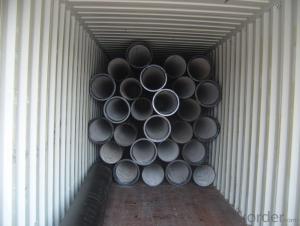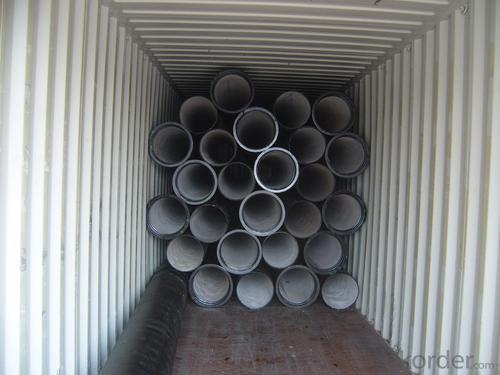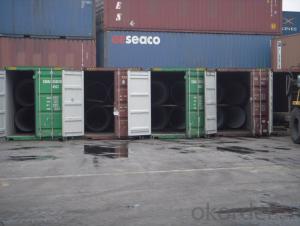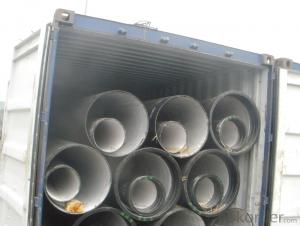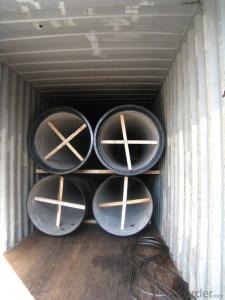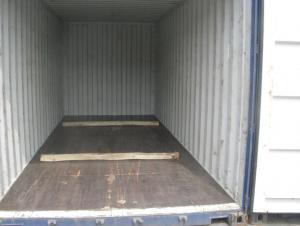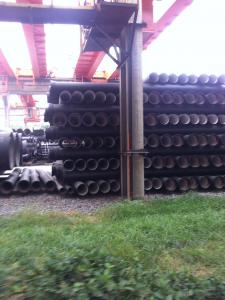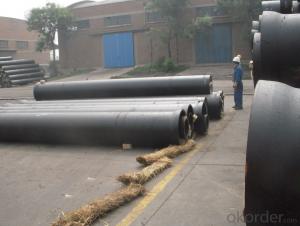DUCTILE IRON PIPE AND PIPE FITTINGS CCLASS DN1500
- Loading Port:
- Tianjin
- Payment Terms:
- TT OR LC
- Min Order Qty:
- 23 pc
- Supply Capability:
- 3000 pc/month
OKorder Service Pledge
OKorder Financial Service
You Might Also Like
· Material : Ductile Cast Iron
· Size Range : DN 80mm to DN 2000mm
· Unit Effective Length : 6m or 5.7m
· Manufacture Standard: ISO 2531:1998/ EN 545:2006/EN 598:2007
· Annual capacity : 200,000 tons
· Coating Exterior: Zinc 130g/m2 according to ISO 8179-1 and bitumen coating 70 microns.
· Cement Interior: Portland Cement/ High Alumina Cement/ Sulphate Resisting Cement Lining according to ISO 4179
· Special requirements on external coating and internal lining can be applied
· We also provide accessories such as SBR/EPDM rubber gaskets, lubricant paste, pipe caps, PE sleeves, etc.
Additional Parts:
Each pipe is strictly inspected according to related standard to ensure permanently high performance.
Easy Installation at site and service free for life
Long Service Lifespan
Quotation will arrive you within 24hours once we get your inquiry.
We guarantee offering you a competitive price.
A copy of original inspection reports of pipes will be offered after shipment.
Photos of loading process will be sent to the customer after shipment effect.
We will follow-up the delivery progress after shipment effect and update to the customer on weekly basis.
- Q: Can ductile iron pipe be used for both water and sewage applications?
- Ductile iron pipe is versatile and can be used for both water and sewage applications. It is known for its strength, durability, and corrosion resistance, making it suitable for various purposes. With its high tensile strength, it can withstand the pressure and heavy loads associated with water and sewage systems. Its smooth interior surface minimizes friction and enhances flow efficiency, making it perfect for transporting water and sewage. It also has excellent resistance to corrosion and chemical attack, ensuring a long lifespan even in harsh environments. Moreover, ductile iron pipe comes in various sizes and configurations, allowing for customization to meet specific water and sewage requirements. In conclusion, ductile iron pipe is a reliable and adaptable option for water and sewage conveyance.
- Q: Are ductile iron pipes suitable for power plant cooling systems?
- Ductile iron pipes are well-suited for power plant cooling systems, offering numerous advantages that render them perfect for such applications. Firstly, their high strength and durability enable them to withstand the immense pressure and heavy loads typically associated with power plant cooling systems. Additionally, these pipes exhibit excellent resistance to corrosion, a vital feature in an environment where water and other cooling fluids continuously flow. Moreover, they boast good thermal conductivity, ensuring efficient heat transfer away from power plant equipment and contributing to the overall cooling process. Lastly, ductile iron pipes are cost-effective compared to other commonly used materials in power plant cooling systems, making them a practical choice. Ultimately, due to their strength, corrosion resistance, thermal conductivity, and cost-effectiveness, ductile iron pipes represent a reliable and suitable option for power plant cooling systems.
- Q: Can ductile iron pipes be used for oil and gas pipelines?
- Yes, ductile iron pipes can be used for oil and gas pipelines. Ductile iron is a strong and durable material that is resistant to corrosion, making it suitable for transporting oil and gas over long distances. Additionally, ductile iron pipes have excellent pressure-bearing capabilities, making them capable of withstanding the high pressures often associated with oil and gas transportation. Furthermore, ductile iron pipes are relatively easy to install and maintain, which adds to their suitability for oil and gas pipelines. However, it is important to note that the specific application and conditions of the pipeline must be considered, and consulting with industry experts is recommended to ensure the proper selection and installation of ductile iron pipes for oil and gas transportation.
- Q: What are the typical lengths of ductile iron pipes?
- The typical lengths of ductile iron pipes range from 18 feet to 20 feet, although shorter lengths such as 10 feet or longer lengths such as 40 feet can also be found depending on specific project requirements.
- Q: Can ductile iron pipes be used in areas with high soil settlement?
- Yes, ductile iron pipes can be used in areas with high soil settlement. Ductile iron pipes are known for their strength and durability, which makes them suitable for various soil conditions, including areas with high soil settlement. These pipes have the ability to withstand external loads and ground movement, making them an ideal choice for such areas. Additionally, ductile iron pipes have a high resistance to corrosion, which further enhances their suitability for use in areas with high soil settlement. However, it is important to consider factors such as proper installation techniques, appropriate bedding and backfill materials, and regular maintenance to ensure the longevity and performance of the ductile iron pipes in areas with high soil settlement. Consulting with a qualified engineer or pipe manufacturer can provide more specific guidance based on the site's conditions and requirements.
- Q: How do ductile iron pipes handle ground movement or settlement?
- Ductile iron pipes are well-suited to handle ground movement or settlement due to their inherent flexibility and durability. The ductile nature of the material allows the pipes to withstand moderate ground movement without cracking or breaking, while their strength ensures they can resist the pressure exerted by settling soil. Additionally, the joints of ductile iron pipes are designed to accommodate slight movements and provide a flexible connection. Overall, ductile iron pipes are a reliable choice for underground infrastructure, offering long-term performance even in areas prone to ground movement or settlement.
- Q: What is the relationship between the mechanical properties of spheroidal graphite cast iron and its spheroidization rate?
- Grade high good, mechanical performance can reach or exceed the standard, the grade is not high, the performance can not be achieved
- Q: How are ductile iron pipes different from other types of pipes?
- DI pipes, also called ductile iron pipes, possess unique properties and are manufactured differently from other pipe types. They are specifically designed to withstand high-pressure systems and offer exceptional strength and durability, setting them apart from PVC, steel, or concrete pipes. One significant distinction lies in the material used. DI pipes are made from a type of cast iron containing additional elements like carbon and silicon, which give them remarkable strength and flexibility. This composition enables DI pipes to handle high-pressure systems, making them suitable for applications requiring reliable water supply, such as water mains, sewer systems, and industrial pipelines. Another distinguishing feature of DI pipes is their ability to endure external loads and pressure. They possess high tensile strength, enabling them to bear heavy loads without cracking or breaking. This property makes them ideal for underground installations, where they can withstand the weight of soil, traffic, and other external factors. Furthermore, DI pipes exhibit excellent corrosion resistance. They are coated with a protective layer, typically through cement lining, which safeguards against rust and corrosion caused by the elements, chemical reactions, or transported fluids. This corrosion resistance significantly extends the pipes' lifespan, reducing maintenance and replacement costs over time. Additionally, DI pipes offer great flexibility. They are renowned for their ductility, meaning they can deform under stress without fracturing, making them less prone to cracks and leaks. This inherent flexibility allows them to withstand ground movement and seismic activities, ensuring a safe and reliable water distribution system. Regarding installation, DI pipes are relatively easy to handle due to their lighter weight compared to materials like concrete or steel. They are also available in various lengths and diameters, making them adaptable to different project requirements. In conclusion, DI pipes distinguish themselves through their exceptional strength, resilience, corrosion resistance, and ease of installation. These properties make them the preferred choice for numerous infrastructure projects, where reliability and longevity are critical factors.
- Q: How does ductile iron pipe handle ground movement and settlement?
- Ductile iron pipe is highly resilient and can effectively handle ground movement and settlement. Its flexibility and strength allow it to withstand external loads and pressure variations caused by ground shifts and settlement. The pipe's inherent ability to absorb and distribute stress ensures its stability, minimizing the risk of damage or failure due to ground movement. Additionally, ductile iron pipes are commonly installed with flexible joints that further accommodate ground shifts, providing a reliable and durable solution for underground applications.
- Q: What is the DN400 installation charge for ductile iron pipes?
- Labor cost: refers to the total amount of wages according to the provisions of the payment to the construction and installation works in the production of workers and ancillary production units of workers costs.
Send your message to us
DUCTILE IRON PIPE AND PIPE FITTINGS CCLASS DN1500
- Loading Port:
- Tianjin
- Payment Terms:
- TT OR LC
- Min Order Qty:
- 23 pc
- Supply Capability:
- 3000 pc/month
OKorder Service Pledge
OKorder Financial Service
Similar products
Hot products
Hot Searches
Related keywords
